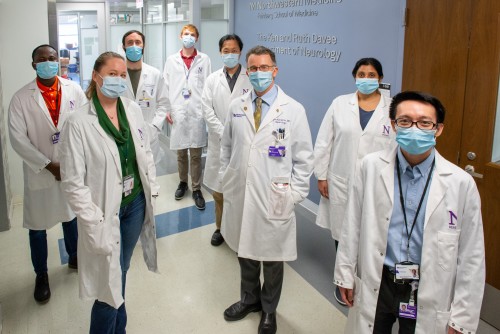Patients hospitalized with COVID-19 frequently experience altered brain function, and those with mild COVID who never required hospitalization often develop neurologic symptoms as part of long COVID. A new study by Northwestern Medicine and published online on March 7, 2022, in Neurology® Neuroimmunology & Neuroinflammation, an official journal of the American Academy of Neurology, sought to find evidence of central nervous system injury in both groups of patients by looking at biomarkers of inflammation in the brain, and damage to nerve cells which are present in the blood, to help determine whether these tests might inform how best to identify and treat patients.
“These markers have been looked at in other COVID populations, but our study population was unique because we have matched cognitive and quality of life measures in addition to the typically studied COVID symptoms like shortness of breath, fatigue and brain fog,” said Igor Koralnik, MD, chief of Neuro-infectious Diseases and Global Neurology in the Ken & Ruth Davee Department of Neurology at Northwestern Medicine, who also oversees the Neuro COVID-19 Clinic at Northwestern Memorial Hospital. “The most noteworthy finding is that we were able to look at a marker of nerve cell damage and a marker of activation of supporting cells in the brain called ‘glial cells’ which are elevated in other diseases of the brain such as multiple sclerosis.”
The study enrolled 64 participants which included hospitalized COVID-19 patients at Northwestern Memorial with acute brain dysfunction known as encephalopathy, non-hospitalized COVID long-haulers treated at the Neuro COVID-19 Clinic, and healthy control subjects from the community.
The study’s biggest findings include:
- The brain is composed of neurons and a large network of supporting cells known as glial cells. This study found that combined molecular evidence of damage to neurons and activation of glial cells, indicating brain inflammation, correlated with symptoms of anxiety in COVID long-haulers.
- Similar molecular findings of neuron damage and brain inflammation were detected in COVID-19 patients hospitalized at Northwestern Memorial with encephalopathy, which ranges from mild confusion to coma, and is the most severe neurologic manifestation of COVID-19.
COVID long-haulers often express frustration that they feel their neuropsychiatric symptoms are dismissed when talking about their experience, and this study’s evidence, suggesting a biological basis for these symptoms, may help to validate their experience and inform the need for further research into the mechanisms leading to these symptoms.
Researchers used a Neuro-Glial score which combines evidence of nerve cell damage as well as brain inflammation which correlated with the neuropsychiatric symptom of anxiety in the patient population.
“The correlation we observed between anxiety and Neuro-Glial score held up when we controlled for age, sex, and BMI, and was observed in both qualitative and quantitative measures of anxiety, which suggests there is a true relationship,” said Barbara Hanson, PhD, who co-authored the study and analyzed all the data in the Northwestern Medicine Neuro COVID-19 research lab. “We hope the observed correlation leads to future research into the mechanistic basis of these neuropsychiatric symptoms in long COVID patients, or perhaps in the biological basis of chronic anxiety in general.”
In October 2020, the Northwestern Medicine Neuro COVID-19 research group published a study in the Annals of Clinical and Translational Neurology that analyzed 509 hospitalized COVID-19 patients and discovered neurologic manifestations happened 82% at any time during the course of the disease.
In March 2021, the same research group published another study in the Annals of Clinical and Translational Neurology that analyzed 100 non-hospitalized COVID-19 long-haulers and discovered 85% of patients experienced four or more neurologic symptoms which impacted their quality of life, and in some patients, their cognitive abilities.
Since May 2020, the Neuro COVID-19 Clinic has seen more than 1,200 patients from around the country with long-hauler symptoms. Tune in to the third episode of “GET BETTER,” a podcast from Northwestern Medicine, which features Dr. Koralnik and his patient, Samantha Lewis, who has struggled with long COVID since October 2020.
Source: Northwestern Medicine
